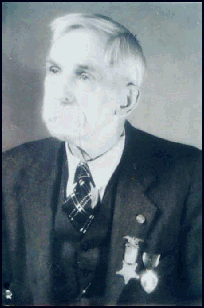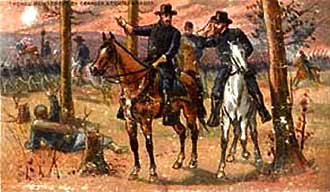
and
The Corwin Ranch

and The Corwin Ranch |

When Elmore Corwin was honored on his 93rd birthday in 1940, he was the sole surviving Civil War veteran on the Mojave Desert. Over the years he had often talked about his wartime experiences, and he liked to remind people that he was born in Mansfield, Ohio, the birthplace of General William Tecumseh Sherman, whose "War is Hell" statement is still quoted today.
In the late 1800s, while living in Kansas, Elmore became quite active in the Grand Army of the Republic (G.A.R.), an organization of Union veterans. He was the Post Commander of the George H. Thomas Post at Ottawa, Kansas.
He continued to be active in California, and in 1915 he was appointed to represent the organization at a conference on national defense in Washington, D. C. This was quite an honor, as the conference included talks by President Wilson, the Secretaries of War and Navy, and several other national defense figures.
He served in various positions, from the lowest to the highest, in the G.A.R. of Southern California. In 1938 he was elected Post Commander, and at the 53rd Encampment held at Pacific Palisades in 1940, became Junior Vice Commander of the Southern California veterans' group.

He traveled extensively on behalf of the G. A. R., and on one occasion, in 1938, he attended the encampment recognizing the 75th anniversary of the Battle of Gettysburg. Late in life he recorded his Civil War experiences, and they are given here in his own words:
My military services began as a private in Company K, 7th Illinois cavalry on the 28th day of March, 1864, at the age of 16 years and 9 months, on a farm near Canton, Illinois. The regiment had served three years and had reenlisted. I joined it in May at Memphis, Tennessee. During the summer it was reorganized, mounted, and prepared for service. Company K and another company were sent to Lagrange, Tennessee, to guard the railroad. It was blackberry time around Lagrange and we feasted on them, with an occasional fat steer and plenty of good vegetables. A pretty fat life for the soldiers of the greatest war of history. Besides we were getting $13 per month and seemingly not in the war at all. Of course we were non-grata with the fair damsels of the community, who remained true to their rebel husbands and sweethearts. 



 So passed the first summer of my experience as a soldier. So far I had not seen a Johnnie Reb, or heard the sound of a gun. Major General Washburn was in command of the Department of Tennessee, with headquarters at Memphis, and Forrest, a great fighter, was in command of all rebel forces in Mississippi. He would not stand and fight a regular battle. Many of his own men were mounted and fought a hit-and-run warfare, much to the annoyance of Washburn. So Washburn sent General H. J. Smith with a detachment of troops to destroy Forrest. Smith caught up with a detachment of Forrest's troops at Oxford, Mississippi, but Forrest, with them, ran into Memphis with the avowed determination to capture Washburn. They ran right through a brand new regiment, in camp at Memphis, that ran for Fort Pickering in their shirt tails! Our regiment, with its many new recruits, was also somewhat demoralized but there were enough old soldiers to quiet then down and show some semblance of resistence, but Forrest was after Washburn and knew better than to stop for a fight, and came so near getting him that while he was fleeing through the back door, Forrest's men were entering the front door of his headquarters. Washburn immediately wired us, at Lagrange, to carry a dispatch to Smith ordering him to return, that Forrest was sacking Memphis. We mounted our horses before daybreak and made a forced march, arriving at the Talackaia river at daybreak the next morning. Smith had destroyed the bridge across the river. That left us without means of crossing. Some of the boys stayed on their horses and made them swim across. Others grabbed hold of a horse's tail and were towed across. Some of us ran to an old railroad bridge and crossed over. All got over safely and we caught up with Smith at Oxford, Mississippi, where we found him skirmishing with a troop of Confederate cavalry. They were soon driven away. Incidentally let me say, that it was the first time I had heard the sound of a bullet from the guns of our Johnnie Reb friends. They seemed to say, hello cousins, but it predominated with the sound of ‘z' prolonged, but we turned thumbs down on any such relationship. News of the sacking and burning of Chambersburg, Pennsylvania, had just reached the ears of Gen. Smith so, in retaliation for the unprovoked and dastardly trick, Smith ordered the city of Oxford burned. I was a witness of this burning. Smith said nothing about sacking the place but these vicious and resentful men took that into their own hands and I witnessed some very uncivilized and inhuman acts committed by men who professed to be Christian gentlemen not only at home in civilized life, but in the ranks of the army. I was a boy of 17 at the time but I blushed and, in my heart resented such things, but I was powerless to prevent them. SACKS HOMEHere is a sample: A Christian man of my company entered a fine two-story house. There in the midst of the destruction and ruin of her home, was a woman from all appearance even then in the pains of childbirth. Every room had been sacked. There was not a bed to be found. In vain did this helpless woman plead her condition. Her home in ruins, not a bed, a carpet, and yet this aforesaid Christian gentleman led the way into the upper story and into the attic where he kindled a fire to burn the empty house which was her only hope of protection from the seasonal heat, or from the eyes of the curious. I was too young for profound thinking at the time, but only the love and grace of God will prevent hell from being full of such Christians. |

After the burning of Oxford we immediately returned to our base at Lagrange and Smith's army reported to Washburn at Memphis. About this time Sherman cut loose from his base at Atlanta taking with him the great part of the troops that had fought and won the great battles in and around Atlanta, and started his famous march from Atlanta to the sea. Gen. George H. Thomas was left with a remnant of Sherman's troops but enough to enable him to fight Hood a fair and square battle. So Hood and Thomas fought a hit-and-run battle which lasted for two months, all of October and November. Hood's object was to outrun and outflank Thomas and reach Nashville first, and Thomas' purpose was to prevent this. Meanwhile Grant was gathering troops and rushing them to Nashville, all available troops both east and west of the Mississippi river. Among these were those of H. J. Smith at Memphis and all others in the department of the Mississippi under command of Washburn. The race for Nashville lasted for two months, both October and November. The only battle of note between Hood and Thomas was the bloody battle of Franklin, Tennessee, on November 30. Thomas had thrown up some breastworks during the night on the side of an open field over which the enemy must cross to attack him. There was a dense forest that completely hid the movement of troops so that Hood's men could get within 20 or 30 rods of the breastworks without their presence being known. Hood's men charged across the small field and were shot down like a game of 10 pins by the withering fire of Thomas' well armed men. ALL KILLEDNot a man in that charge lived to reach the breastworks. Our cavalry was on Thomas' right flank and afterwards I was over this open field which had been turned into a graveyard with the graves so thick that you could step from one grave to another, all over the field. Immediately after the battle of Franklin, Thomas retreated to Fort Pickering, now Fort Nashville, and the next two weeks were spent in the preparation for the great battle of Nashville. This occurred on the 15th and 16th of December. The terrain around Nashville is rough and full of hills and valleys. These hills were fortified, on the one hand by Thomas and on the other by Hood. Both sides constructed small forts and installed cannon. |

But when the battle was on, these hills echoed and reechoed with one volley after another of a most impressive artillery battle that could be imagined. The very hills and valleys picked up and echoed and reechoed the one volley after another until it seemed as if a volley would never end. The echo would go and come until you would think there was a battle going on miles away, and then returned to start all over again. I can give you but a faint impression of this wonderful artillery battle. At this time, contrary to the usual custom, the cavalry was being counted off by fours and number four remained with the lead horses and the other three went on foot in the evening of the second and last day of the battle. Lieutenant Shriner and myself found a redoubt which was made by the uprooting of a tree, in which we protected ourselves from the bullets as much as may be, but our firing drew the fire of the rebels and we soon found ourselves in a very hot place. Finally there was a charge ordered and both the lieutenant and myself fell wounded. |

WOUNDEDHis wound proved to be only a flesh wound. I was struck right through my purse pocket in the thick of my left thigh. The lieutenant sent some of my comrades to carry me from the field and after receiving first aid at the field hospital, in Nashville, with a very severe and dangerous wound, as the large artery of my leg was touched and it was feared that mortification would open it and bleed me to death. Twice, by a hair, I escaped amputation, once in the field hospital and again at the hands of a civilian surgeon of wide experience, who opposed two army surgeons, often more anxious for the experience than for humani tarian reasons. By careful nursing and the surgeon's scientific knowledge not only was my leg saved but my life also. On February 1, six weeks later, I arrived at home where I convalesced and became strong and well. I rejoined my regiment at Bridgeport on the Tennessee river. My comrades gave me a hearty welcome and the captain made me a corporal, which I appreciated very much as I was a recruit in an old regiment that had seen four years of service. The war was over, but there was policing and reconstruction work to be done and therefore we were not discharged until November, 1865. |


 END
END


 PAGE
1|
2|
3|
4|
5|
6|
7|
8|
9|
10
PAGE
1|
2|
3|
4|
5|
6|
7|
8|
9|
10
